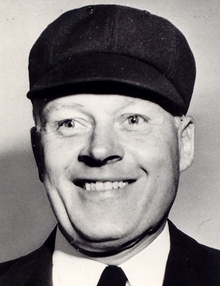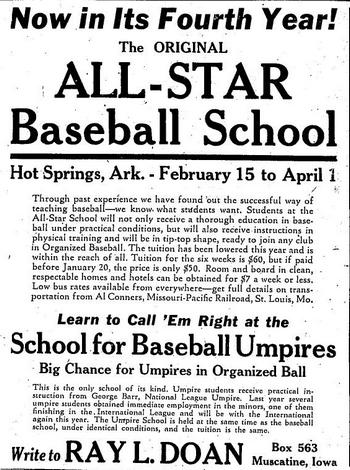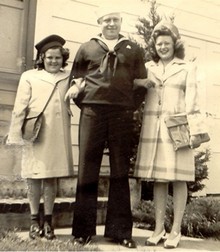

Go on, why not sponsor this page for $5.00 and have your own message appear in this space. Click here for details. |
Scotty Robb
Date and Place of Birth:
September 23, 1906 Hoffmanville, Maryland
Date and Place of Death: April 10, 1969 Montclair, New Jersey
Baseball Experience: Major League
Position: Umpire
Rank: Printer Second Class
Military Unit: US Navy
Area Served: European Theater of Operations
A
bad arm ended his playing days and in 1936 Robb attended George
Barr’s School for Baseball Umpires in Hot Springs, Arkansas. He
received his first professional assignment in the Class D Cape
Breton Colliery League in 1937. The four-team league, at the heart
of the hard-nosed coal mining community of Nova Scotia, Canada was a
baptism of fire for Robb, but he faithfully learned his trade for
three tempestuous seasons.
“It was a pretty rough league,” explains Robb’s grandson Bruce Walko,
“and the local miners didn’t like their team losing. The Royal
Canadian Mounted Police had to rescue him a few times.”
The league disbanded after the 1939 season, and Robb umpired in the
Northern College League the following year. He worked games in New
Hampshire, Vermont and Maine that summer and returned to New Jersey
to gain state-wide recognition handling scholastic and
intercollegiate games for Rutgers, Seton Hall, Upsala College and
Blair Academy.
In
1943, Robb substituted for an umpire who had been taken ill in the
Class AA International League. It was meant to be a brief
appointment but he performed well and was quickly offered a contract
to remain in the league.
Printer Second Class Robb spent 19 months in service with the US
Navy’s Amphibious Forces, 15 of those in England and France as a
special courier, frequently flying between the two countries.
While in England, Robb overheard some Canadian troops swapping
baseball stories. They were talking about how, some years ago, they
had taken pot-shots at a departing umpire’s Studebaker because of a
call he made that they disagreed with. The Studebaker had two bullet
holes in the windshield and the driver had been Scotty Robb. Imagine
his surprise at hearing this story clear around the world!
Robb found time while in England to keep his umpiring skills fresh,
and one of his few requests from his wife was for her to mail him
his rule book. Robb was very aware of the significance of
distinguishing an umpire from the ballplayers and because everyone
on the ballfields of England were mostly wearing military fatigues
he needed to find an alternative. He found an English woman who had
a navy blue coat and she fashioned a jacket out of it for him.
On
June 10, 1945, Robb umpired an all-professional game held at
Stamford Bridge soccer stadium in London, England. The two teams –
the Whites and the Grays – were made up of minor league and major
league players including Paul Campbell, Ted Kleinhans and Dan
Carnevale.
Robb left the Navy in November 1945 and returned to his winter
printing job in Cedar Grove. He was back in the International League
in 1946 and was umpiring at first base for Jackie Robinson’s minor
league debut with the Montreal Royals against Jersey City. Robinson
hit a home run and three singles and drove in four runs.
On
August 29, 1947, Robb joined the National League. “Robby’s debut in
the senior circuit found him a bit jittery,” wrote Dan Feitlowitz in
The Sporting News on November 19, 1947. “He opened at Philly,
working on the bases, and then on his third day he was assigned to
work behind the plate for a Giant-Dodger game. Scotty claimed that
his knees rattled at a furious pace. But he did not have a single
dispute.”
In
October 1947, a testimonial dinner was given for Robb in Cedar
Grove. He was presented with a new car and more than 1,000
well-wishers were in attendance, causing Harold Hoffman, former
governor of New Jersey, to quip: “I never knew an umpire could have
that many friends.”
Robb quickly became a well-respected umpire in the National League,
working the 1950 and 1951 all-star games, and was slated to work the
1952 World Series. In a Sporting News article dated February
7, 1951, Robb named Brooklyn’s Roy Campanella as the best catcher in
the league and said that Red Munger of the St Louis Cardinals had
the best fastball and best curve. He named Curt Simmons, Robin
Roberts and Don Newcombe as the best pitchers and said Leo Durocher
was the “sharpest man” in baseball.
But on April 22, 1952 in Cincinnati, his career turned upside down.
In the third inning, Robb, working behind home plate, called Solly
Hemus of the Cardinals out on strikes. Hemus protested and threw his
bat toward the first-base grandstand. Robb ejected him from the game
and manager, Eddie Stanky, rushed from the dugout protesting
furiously. There are varying accounts of what happened next. Stanky
claimed that Robb shoved him, while Robb insisted that
he told Stanky to go away and when he
reached across for his mask - which was under his arm - Stanky went
down.
"I don’t think he would have
actually pushed anyone," says Bruce Walko. "It was his sixth year in
the major leagues and he had International League and the rough and
tough Cape Breton league behind him."
National League president Warren Giles publicly reprimanded Robb a
few days later. “For pushing manager Stanky, umpire Robb has been
disciplined and fined an amount which, in my judgement, is
commensurate with the act,” Giles declared.
Robb’s reaction to the fine – which was $100 – was to write a check
for the amount, resign from baseball and return to his printing job
in Cedar Grove.
Two days later he was offered a job by American League president
Will Harridge. “We needed an umpire and we considered Robb a good
one,” Harridge told the Associated Press on May 8, 1952.
“I’m happy to be back in baseball,” said Robb in response. “You can
judge how happy I am when I say that when Mr Harridge approached me
with an offer of the American League umpiring job, I was so choked
up I couldn’t talk for a minute or two.”
Robb became one of the few umpires to work in both leagues and was
back in 1953. But on June 28 - despite being only 46, an age when
umpires are coming into their prime - he retired from baseball to
devote his time to his printing business. Bruce Walko
is extremely proud of his grandfather's contributions to baseball.
"The only way you can tell if the umpire did a good job is that no
one noticed him. They do their job quietly and don’t get much
recognition, but baseball wouldn’t be the same without them."
Scotty Robb passed away at Mountainside Hospital in Montclair, New
Jersey on April 10, 1969. He was 62 years old.
Thanks to Scotty Robb’s grandson, Bruce Walko, his daughters Peg
Roberts and Louise Walko and his widow Alta Robb, who celebrated her
99th birthday on August 9, 2007.
Created August 8, 2007. Updated August
14, 2007.
Copyright © 2007 Gary Bedingfield (Baseball
in Wartime). All Rights Reserved.



Scotty
Robb in May 1944 with his daughters Peg and Louise